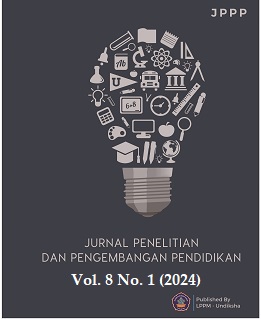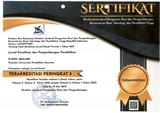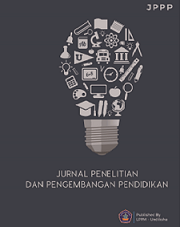Character Education TPACK Skills to Emergency Remote Learning During The Covid-19 Pandemic
DOI:
https://doi.org/10.23887/jppp.v8i1.62642Keywords:
Character Education, Learning Platforms, Online Learning, T-PACKAbstract
The transition of education to an online environment due to the COVID-19 pandemic presents new challenges for teachers and students. On the other hand, there is only a little research on developing PCK related to character education. Pedagogical Content Knowledge (TPACK) technology solves today's online learning problems. This research aims to analyze Character Education TPACK skills for emergency distance learning during the COVID-19 pandemic. This research is a mixed methods research with a quantitative approach and is supported qualitatively. The population and sample are 200 teachers. The data collection method uses a questionnaire. The research instrument was a questionnaire consisting of 33 statements and 5 open questions, which were distributed. Data were examined numerically and subjectively using component analysis and teacher explanatory descriptions. Data analysis techniques use quantitative statistics. The research results show that the mastery of TPACK Character Education in online classes uses different learning media and instructional platforms. This research implies that in the future, teachers can increase the use of teaching materials, media, methods and learning models for appropriate subjects and follow TPACK integrated with character education to create an active, fun and meaningful learning atmosphere.
References
Abidin, Z. (2019). Analisis Pedagogi Content Knowledge Di Dalam Konteks Pendidikan Karakter: Sebuah Study Meta-Synthesis. Quagga: Jurnal Pendidikan dan Biologi, 11(1), 34–42. https://doi.org/10.25134/quagga.v11i1.1512. DOI: https://doi.org/10.25134/quagga.v11i1.1512
Afroz, R., Islam, N., Rahman, S., & Zerin Anny, N. (2021). Students’ and teachers’ attitude towards online classes during Covid-19 pandemic. International Journal of Research in Business and Social Science, 10(3), 462–476. https://doi.org/10.20525/ijrbs.v10i3.1155. DOI: https://doi.org/10.20525/ijrbs.v10i3.1155
Akoglu, H. (2018). User’s guide to correlation coefficients. Turkish Journal of Emergency Medicine, 18(3), 91–93. DOI: https://doi.org/10.1016/j.tjem.2018.08.001
Andriyani, N. L., & Suniasih, N. W. (2021). Development of Learning Videos Based on Problem-Solving Characteristics of Animals and Their Habitats Contain in Ipa Subjects on 6th-Grade. Journal of Education Technology, 5(1), 37. https://doi.org/10.23887/jet.v5i1.32314. DOI: https://doi.org/10.23887/jet.v5i1.32314
Arifianto, C. F., Mutawali, & Subekti, H. (2021). The Teachers’ Online Readiness: an evaluation of Online Learning during Covid-19 Pandemic in Indonesia. International Journal of Social Learning (IJSL), 1(3), 270–282. https://doi.org/10.47134/ijsl.v1i3.63. DOI: https://doi.org/10.47134/ijsl.v1i3.63
Ariyani, F., Fuad, M., Suyanto, E., & Muhammad, U. A. (2023). Lampung Language Online Learning during the Covid-19 Outbreak: How are the Teacher’s TPACK Skills? International Journal of Instruction, 16(1), 311–332. https://doi.org/10.29333/iji.2023.16118a. DOI: https://doi.org/10.29333/iji.2023.16118a
Basilaia, G., & Kvavadze, D. (2020). Transition to Online Education in Schools during a SARS-CoV-2 Coronavirus ( COVID-19 ) Pandemic in Georgia. Pedagogical Research, 5(4). https://doi.org/10.29333/pr/7937. DOI: https://doi.org/10.29333/pr/7937
Bhattacharjee, Baishakhi, & Deb, K. (2016). Role of ICT in 21 st Century’s Teacher Education. International Journal of Education and Information Studies, 6(1), 1–6.
Chao, J. Y., Tzeng, P. W., & Po, H. Y. (2017). The study of problem solving process of e-book PBL course of atayal senior high school students in Taiwan. Eurasia Journal of Mathematics, Science and Technology Education, 13(3), 1001–1012. https://doi.org/10.12973/eurasia.2017.00654a. DOI: https://doi.org/10.12973/eurasia.2017.00654a
Cuhadar, C. (2018). Investigation of PreService Teachers’ Levels of Readiness to Technology Integration in Education. Contemporary Educational Technology, 9(1), 61–75. DOI: https://doi.org/10.30935/cedtech/6211
Ferri, F., Grifoni, P., & Guzzo, T. (2020). Online Learning and Emergency Remote Teaching: Opportunities and Challenges in Emergency Situations. Societies, 10(4), 86. https://doi.org/10.3390/soc10040086. DOI: https://doi.org/10.3390/soc10040086
Fitriyani, Y., Fauzi, I., & Sari, M. Z. (2020). Motivasi Belajar Mahasiswa Pada Pembelajaran Daring Selama Pandemik Covid-19. Profesi Pendidikan Dasar, 7(1), 121–132. https://doi.org/10.23917/ppd.v7i1.10973. DOI: https://doi.org/10.23917/ppd.v7i1.10973
Fuad, M, Ariyani, F., Suyanto, E., & Shidiq, A. S. (n.d.). Exploring teachers’ TPCK: Are indonesian language teachers ready for online learning during the covid-19 outbreak? Universal Journal of Educational Research, 8(11B), 6091–6102. https://doi.org/10.13189/ujer.2020.082245.
Fuad, Muhammad, Ariyani, F., Suyanto, E., & Shidiq, A. S. (2020). Exploring teachers’ tpck: Are indonesian language teachers ready for online learning during the covid-19 outbreak? Universal Journal of Educational Research, 8(11B), 6091–6102. https://doi.org/10.13189/ujer.2020.082245. DOI: https://doi.org/10.13189/ujer.2020.082245
Fuad, Muhammad, Efendi, A., & Muhammad, U. A. (2020). The Use of Pepaccur Local Wisdom for Indonesian Literary Teaching Materials. JPI (Jurnal Pendidikan Indonesia), 9(2), 213. https://doi.org/10.23887/jpi-undiksha.v9i2.22779. DOI: https://doi.org/10.23887/jpi-undiksha.v9i2.22779
Gomez, M. V. (2022). Open Higher Education for Refugees to Access: Virtual Learning in the Covid-19 Pandemic. International Journal of Instruction, 15(2), 715–736. https://doi.org/10.29333/iji.2022.15239a. DOI: https://doi.org/10.29333/iji.2022.15239a
Hanik, E. U., Puspitasari, D., Safitri, E., Firdaus, H. R., Pratiwi, M., & Innayah, R. N. (2022). “Integrasi Pendekatan TPACK (Technological, Pedagogical, Content Knowledge) Guru Sekolah Dasar SIKL dalam Melaksanakan Pembelajaran Era Digital”. Journal of Educational Integration and Development, Volume 2, Nomor 1 (hlm. 15-27). JEID: Journal of Educational Integration and Development, 2(1), 15–27. DOI: https://doi.org/10.55868/jeid.v2i1.97
Hariati, H., M. Ilyas, M. I., & Mohammad Siddik. (2022). Analisis Pembelajaran Daring Di Masa Pandemi Covid-19 Pada Kemampuan Technological Pedagogical And Content Knowledge (TPACK) Guru Sekolah Dasar. Journal of Instructional and Development Researches, 2(1), 32–47. https://doi.org/10.53621/jider.v2i1.119. DOI: https://doi.org/10.53621/jider.v2i1.119
Hastasari, C., Setiawan, B., & Aw, S. (2022). Students’ communication patterns of islamic boarding schools: the case of Students in Muallimin Muhammadiyah Yogyakarta. Heliyon, 8(1), 1–7. https://doi.org/10.1016/j.heliyon.2022.e08824. DOI: https://doi.org/10.1016/j.heliyon.2022.e08824
Hirschman, K., & Wood, B. (2018). 21st century learners: Changing conceptions of knowledge, learning and the child. The New Zealand Annual Review of Education, 23(June), 20. https://doi.org/10.26686/nzaroe.v23i0.5280. DOI: https://doi.org/10.26686/nzaroe.v23i0.5280
I-Ju, C., Ming-Kuo, H., Yi-Kai, L., Yu-Heng, C., & Tzong-Ming, W. (2020). Intention to implement IT instruction for teacher learning. Universal Journal of Educational Research, 8(5), 1683–1686. https://doi.org/10.13189/ujer.2020.080504. DOI: https://doi.org/10.13189/ujer.2020.080504
Janse, R. J., Hoekstra, T., Jager, K. J., Zoccali, C., Tripepi, G., Dekker, F. W., & Diepen, M. van. (2021). Conducting correlation analysis: important limitations and pitfalls. Clinical Kidney Journal, 14(11), 2332–2337. https://doi.org/https://doi.org/10.1093/ckj/sfab085. DOI: https://doi.org/10.1093/ckj/sfab085
Jerome, L., & Kisby, B. (2019). The Rise of Character Education in Britain: Heroes, Dragons and the Myths of Character. Springer Nature. DOI: https://doi.org/10.1007/978-3-030-27761-1
Kaliappen, N., Wan-Ismail, W.-N. A., Ghani, A. B. H. A., & Sulisworo, D. (2021). Wizer.me and Socrative as innovative teaching method tools: Integrating TPACK and Social Learning Theory. International Journal of Evaluation and Research in Education (IJERE), 10(3). https://doi.org/10.11591/ijere.v10i3.21744. DOI: https://doi.org/10.11591/ijere.v10i3.21744
Kim, H. W., & Kim, M. K. (2021). A Case Study of Children’s Interaction Types and Learning Motivation in Small Group Project-Based Learning Activities in a Mathematics Classroom. Eurasia Journal of Mathematics, Science and Technology Education, 17(12). https://doi.org/10.29333/ejmste/11415. DOI: https://doi.org/10.29333/ejmste/11415
Lestiyanawati, R. (2020). The Strategies and Problems Faced by Indonesian Teachers in Conducting e-learning during COVID-19 Outbreak. CLLiENT (Culture, Literature, Linguistics, and English Teaching), 2(1), 71–82. https://doi.org/10.32699/cllient.v2i1.1271. DOI: https://doi.org/10.32699/cllient.v2i1.1271
Lim, P. S., Din, W. A., Nik Mohamed, N. Z., & Swanto, S. (2021). Current Trends in TPACK Research in English Language Education: a Systematic Review of Literature From 2017 To 2021. International Journal of Education, Psychology and Counseling, 6(43), 219–234. https://doi.org/10.35631/ijepc.643018. DOI: https://doi.org/10.35631/IJEPC.643018
Literat, I. (2021). “Teachers Act Like We’re Robots”: TikTok as a Window Into Youth Experiences of Online Learning During COVID-19. AERA Open, 7(1), 1–15. https://doi.org/10.1177/2332858421995537. DOI: https://doi.org/10.1177/2332858421995537
Murphy, M. P. A. (n.d.). COVID-19 and emergency eLearning: Consequences of the securitization of higher education for post-pandemic pedagogy. Contemporary Security Policy, 41(3), 492–505. https://doi.org/10.1080/13523260.2020.1761749. DOI: https://doi.org/10.1080/13523260.2020.1761749
Mustika, M., & Temarwut, R. (2022). Membangun TPACK Guru IPS Melalui Moodle berbasis Blended Learning dalam Pembelajaran Tatap Muka Terbatas. Jurnal Jendela Pendidikan, 2(02), 313–323. https://doi.org/10.57008/jjp.v2i02.215. DOI: https://doi.org/10.57008/jjp.v2i02.215
Ning, Y., Zhou, Y., Wijaya, T. T., & Chen, J. (2022). Teacher Education Interventions on Teacher TPACK: A Meta-Analysis Study. Sustainability, 14(11791), 1–21. https://doi.org/10.3390/su141811791. DOI: https://doi.org/10.3390/su141811791
Novayanto, A. D., & Pribadi, B. A. (2023). Pengaruh Penggunaan Google Clasroom Dalam Pembelajaran Jarak Jauh Terhadap Interaksi Belajar Siswa. Jurnal Teknologi Pendidikan, 12(3), 84–96.
Paidi, Subali, B., & Handoyo, L. D. (2021). The mastery of technological, pedagogical, and content knowledge among Indonesian biology teachers. European Journal of Educational Research, 10(3), 1063–1073. https://doi.org/10.12973/EU-JER.10.3.1063. DOI: https://doi.org/10.12973/eu-jer.10.3.1063
Pane, S. M., Lubis, M., & Sormin, S. A. (2022). Lembar Kerja Peserta Didik (LKPD) Bermuatan Kearifan Lokal Terintegrasi TPACK untuk Siswa Kelas V Sekolah Dasar, Efektifkah? Jurnal Penelitian dan Pengembangan Pendidikan, 6(3), 377–384. https://doi.org/10.23887/jppp.v6i3.52482. DOI: https://doi.org/10.23887/jppp.v6i3.52482
Phungsuk, R., Viriyavejakul, C., & Ratanaolarn, T. (2017). Development of a problem-based learning model via a virtual learning environment. Kasetsart Journal of Social Sciences, 38(3), 297–306. https://doi.org/10.1016/j.kjss.2017.01.001. DOI: https://doi.org/10.1016/j.kjss.2017.01.001
Prasetiyo, W. H., Sari, B. I., Naidu, N. B. M., Sa’diyah, H., Saputri, R. N., Dewantara, J. A., & Patmisari. (2022). Dataset of TPACK in teaching practice: Adversity quotient, attitude computer technology and self-efficacy among Indonesian teachers. Data in Brief, 45(2022), 1–14. DOI: https://doi.org/10.1016/j.dib.2022.108749
Prayitno, H. J., Markhamah, Nasucha, Y., Huda, M., Ratih, K., Ubaidullah, Rohmadi, M., Boeriswati, E., & Thambu, N. (2022). Prophetic educational values in the Indonesian language textbook: pillars of positive politeness and character education. Heliyon, 8(8), e10016. https://doi.org/https://doi.org/10.1016/j.heliyon.2022.e10016 DOI: https://doi.org/10.1016/j.heliyon.2022.e10016
Rahmadi, I. F. (2021). Teachers’ Technology Integration and Distance Learning Adoption Amidst the Covid-19 Crisis: a Reflection for the Optimistic Future. Turkish Online Journal of Distance Education, 22(2), 26–41. https://doi.org/10.17718/tojde.906472. DOI: https://doi.org/10.17718/tojde.906472
Rahman, A. A., Angraeni, A., & Fauzi, R. A. (2021). The Activation of Learners’ Metacognition to Promote Learning Autonomy of Good Language Learners. Pegem Egitim ve Ogretim Dergisi, 11(4), 249–253. https://doi.org/10.47750/pegegog.11.04.24. DOI: https://doi.org/10.47750/pegegog.11.04.24
Rasmini, R., & Nofikusumawati Peni, N. R. (2024). Implementasi Karakter Profil Pelajar Pancasila Dalam Pembelajaran Matematika Smk Berbasis Tpack. Khazanah Pendidikan, 18(1), 118. https://doi.org/10.30595/jkp.v18i1.21457. DOI: https://doi.org/10.30595/jkp.v18i1.21457
Retnosari, D. S., & Hakim, L. (2021). E-Modul Interaktif Perbankan Syariah Sebagai Bahan Ajar Alternatif dalam Menunjang Perkuliahan Daring Mahasiswa. Jurnal Penelitian dan Pengembangan Pendidikan, 5(2), 206–214.
Ritonga, A. W., Ritonga, M., Nurdianto, T., Kustati, M., Rehani, R., Lahmi, A., Yasmadi, Y., & Pahri, P. (2020). E-Learning Process of Maharah Qira’ah in Higher Education during the Covid-19 Pandemic. International Journal of Higher Education, 9(6), 227. https://doi.org/10.5430/ijhe.v9n6p227. DOI: https://doi.org/10.5430/ijhe.v9n6p227
Robinson, M., & Rusznyak, L. (2020). Learning to teach without school-based experience: conundrums and possibilities in a South African context. Journal of Education for Teaching, 46(4), 517–527. https://doi.org/10.1080/02607476.2020.1800408. DOI: https://doi.org/10.1080/02607476.2020.1800408
Saboowala, R., & Manghirmalani Mishra, P. (2021). Readiness of In-service Teachers Toward a Blended Learning Approach as a Learning Pedagogy in the Post-COVID-19 Era. Journal of Educational Technology Systems, 50(1), 9–23. https://doi.org/10.1177/00472395211015232. DOI: https://doi.org/10.1177/00472395211015232
Salehudin, M., Zulherman, Z., Arifin, A., & Napitupulu, D. (2021). Extending Indonesia Government Policy for E-Learning and Social Media Usage. Pegem Egitim ve Ogretim Dergisi, 11(2), 14–26. https://doi.org/10.14527/pegegog.2021.00.
Satriawati, G., Mas’ud, A., Dwirahayu, G., Dahlan, J. A., & Cahya, E. (2022). Analisis Kemampuan Technological Pedagogical Content Knowledge (Tpack) Mahasiswa Program Studi Pendidikan Matematika Pada Mata Kuliah Microteaching Di Masa Pandemi Covid 19. FIBONACCI: Jurnal Pendidikan Matematika dan Matematika, 8(1), 73. https://doi.org/10.24853/fbc.8.1.73-84. DOI: https://doi.org/10.24853/fbc.8.1.73-84
Schober, P., Boer, C., & Schwarte, L. A. (2018). Correlation Coefficients: Appropriate Use and Interpretation. Anesthesia & Analgesia, 126(5), 1763–1768. DOI: https://doi.org/10.1213/ANE.0000000000002864
Setiawan, H., Phillipson, S., Sudarmin, & Isnaeni, W. (n.d.). Current trends in TPACK research in science education: A systematic review of literature from 2011 to 2017. Journal of Physics: Conference Series, 1317(1), 1–6. https://doi.org/10.1088/1742-6596/1317/1/012213. DOI: https://doi.org/10.1088/1742-6596/1317/1/012213
Shereen, M. A., Khan, S., Kazmi, A., Bashir, N., & Siddique, R. (2020). COVID-19 infection: Origin, transmission, and characteristics of human coronaviruses. In Journal of Advanced Research (Vol 24). https://doi.org/10.1016/j.jare.2020.03.005. DOI: https://doi.org/10.1016/j.jare.2020.03.005
Slamet, T. I. (2014). Guru Dan Digital Superhero : Gamifikasi Untuk. 435–445.
Susanti, S., & Perdana, F. (2020). Digital Literacy of Teachers in Online Learning at Elementary School in Bandung City. European Journal of Molecular & Clinical Medicine, 7(1), 3784–3793.
Usak, M., Masalimova, A. R., Cherdymova, E. I., & Shaidullina, A. R. (2020). New playmaker in science education: COVID-19. Journal of Baltic Science Education, 19(2), 180–185. https://doi.org/10.33225/jbse/20.19.180. DOI: https://doi.org/10.33225/jbse/20.19.180
Velle, L., Newman, S., Montgomery, C., & Hyatt, D. (2020). Initial teacher education in England and the Covid-19 pandemic: challenges and opportunities. Journal of Education for Teaching, 46(4), 596–608. https://doi.org/10.1080/02607476.2020.1803051. DOI: https://doi.org/10.1080/02607476.2020.1803051
Watkins, J. (n.d.). Preventing a covid-19 pandemic. The BMJ, 368(February), 1–2.
Widyaningsih, N., & Keguruan, F. (2022). Pelatihan Pembuatan Media Pembelajaran Interaktif Berbasis Online Pada Guru Sekolah. 2666, 347–361.
Xue, E., Li, J., & Xu, L. (2020). Online education action for defeating COVID-19 in China: An analysis of the system, mechanism and mode. Educational Philosophy and Theory, 54(6), 799–811. https://doi.org/10.1080/00131857.2020.1821188. DOI: https://doi.org/10.1080/00131857.2020.1821188
Zeng, Y., Wang, Y., & Li, S. (2022). The relationship between teachers’ information technology integration self-efficacy and TPACK: A meta-analysis. Frontiers in Psychology, 13, 1–13. https://doi.org/10.3389/fpsyg.2022.1091017. DOI: https://doi.org/10.3389/fpsyg.2022.1091017
Zulyusri, Desy, Santosa, T. A., & Yulianti, S. (2022). Meta-analysis The Effect of the Technological Pedagogical Content Knowledge (TPACK) Model Through Online Learning on Biology Learning Outcomes, Learning Effectiveness, and 21st Century Competencies of Post-Covid-19 Students and Teachers. International Journal of Progressive Sciences and Technologies, 34(2), 285–294. https://doi.org/10.52155/ijpsat.v34.2.4631. DOI: https://doi.org/10.52155/ijpsat.v34.2.4631
Downloads
Published
How to Cite
Issue
Section
License
Copyright (c) 2023 Agnes Widyaningrum

This work is licensed under a Creative Commons Attribution-ShareAlike 4.0 International License.
Authors who publish with the Jurnal Penelitian dan Pengembangan Pendidikan agree to the following terms:
- Authors retain copyright and grant the journal the right of first publication with the work simultaneously licensed under a Creative Commons Attribution License (CC BY-SA 4.0) that allows others to share the work with an acknowledgment of the work's authorship and initial publication in this journal.
- Authors are able to enter into separate, additional contractual arrangements for the non-exclusive distribution of the journal's published version of the work (e.g., post it to an institutional repository or publish it in a book), with an acknowledgment of its initial publication in this journal.
- Authors are permitted and encouraged to post their work online (e.g., in institutional repositories or on their website) prior to and during the submission process, as it can lead to productive exchanges, as well as earlier and greater citation of published work. (See The Effect of Open Access)








